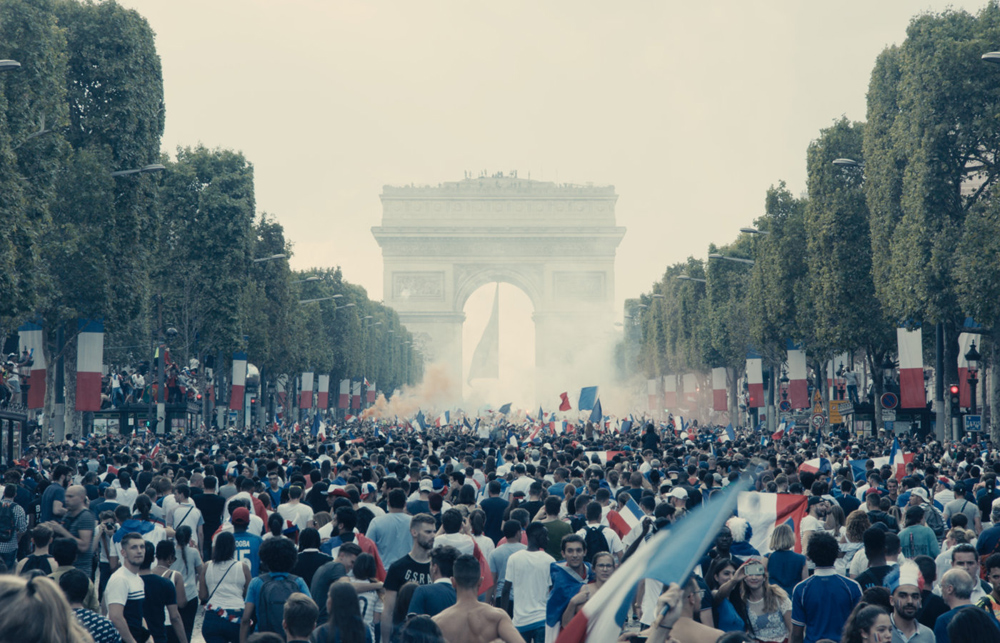As it had become a necessity in many parts of his life, Ladj Ly had been keeping an eye on things as the French National Soccer Team was making their way through the FIFA World Cup in the summer of 2018. The notion of a big, unifying event for his home country had been in his head for the start of his first feature “Les Miserables,” where he would insert a few of his young protagonists from the underserved community of Montfermeil to celebrate in the streets in Paris, but of course everything needed to fall in place just right.
“We knew they were qualified in the finals, so we took the kids, we took the cameras, and we shot in real [time] the kids being there when [France] actually won the cup,” Ly said nonchalantly, shaking his head upon being asked if getting the shots he needed to show the contradictions of a culture in which tens of thousands can unify around a sport even when much deeper divides exist was daunting.
Ly doesn’t appear to be intimidated by much of anything, which is likely how he was able to create one of the most overwhelming cinematic experiences of recent memory with “Les Miserables,” a gripping thriller fashioned from the real-life tensions between the local police and the various ethnic groups that populate the low-income housing projects known as Les Bosquets. Set in the same area as the Victor Hugo classic it nods to with its title, little has changed in terms of economic improvement in the centuries in between, leading cops to assume the tower blocks are a hotbed for crime. However, after witnessing various injustices to his neighbors based on specious claims, Ly took it upon himself to begin surreptitiously filming police activity and “Les Miserables” is the culmination of two decades the filmmaker spent filming within his community after releasing much of his footage online or turning it into more formal documentaries such as “365 Jours à Clichy-Montfermeil.”
The director seems to resist speaking about filmmaking in technical terms, describing it as instinctual like muscle memory from bringing scenes he witnessed in real life into the drama, but there’s a dazzling sophistication on display as he tracks the fallout in all corners of the community from a confrontation between the young African-American boys in the neighborhood and a trio of cops, including longtime partners Chris (Alexis Manenti) and Gwada (Djebril Zonga) and their new charge Stéphane (Damien Bonnard), both more officious and less hardened than who he accompanies on the ride-along. Inspired by the time Ly captured footage of a police beating that ended with the accidental discharge of a firearm in 2008, the nailbiter revolves around the anxieties felt by all involved when the incident is caught on camera and the officers attempt to find the source and stop its dissemination online.
Whittled down from 100 hours of footage, “Les Miserables” conveys the feeling of being under constant surveillance, but sees that power shift from the oppressors to the oppressed and carries a crackling energy as it follows the cops into parts of the community that they’ve likely already written off, only to discover how complex they are. The film, as a whole, is quite the revelation, rousing and thought-provoking in equal turns, and after being selected by France as their official Oscar submission for Best International Feature following its Jury Prize at Cannes, it is primed to explode onto American screens this week. To mark the occasion, Ly, with the assistance of a translator, spoke about the responsibility of bringing the stories of his community to the screen, his path into filmmaking and having the film find its way to French President Emmanuel Macron.
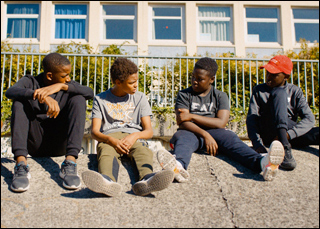
Yeah, I grew up in a really difficult neighborhood where the cops really behaved pretty badly and I really wanted to show the injustices that are going on around there. I wanted to show the living conditions of the people, to denounce that and bear witness, especially when they do police blunders and brutality, so I’ve been doing something called CopWatch. Then I caught the blunder on the video and then [the authorities] asked, “could you please tell us what we should do? Should we show this video or not before I broadcast it on the net? Because I was always censored, I decided to make my own movie and to diffuse this movie, but then I also asked for advice from Costa-Gavras and he said, “You should go and see a journalist. So I did the video, I showed it online [myself], but then I gave it to the journalist who broadcast it on his site and that’s why it went viral.
After that, there’s been procedures, internal affairs came in and cops have been suspended. That’s the first time this happened in France. It’s always been a lot of tension between the community and the authorities. And the cops were really pissed off, so the tension built because the cops that fell down because of [the spread of this video], so they were actually really upset at me. But I saw how powerful the images are and that’s when I decided to tell this story.
You actually film inside this same neighborhood now. Was it a challenge to come back?
We absolutely had no problems at all because we’re on my turf basically. I know everybody. 200 people agree to be committed and to be implicated in that and the kids as well, so we had no problems at all as far as shooting was concerned. I’ve been living there all my life, I know every place in it, so this is something that I wanted to do and show. It took me time to build my team [over the years], but also I’ve been shooting a lot of videos and documentaries [there] before, so I managed to build it.
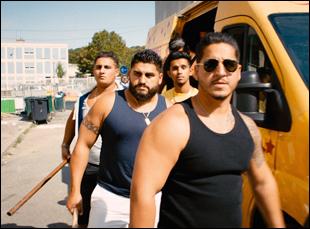
I had a structure for the movie, but because I’m coming from documentaries and I’m always documenting things, like if a mother was coming down the stairs, I would go and film it, so there was always a part of my filmmaking that I would always incorporate what’s going on. I’m not closed off at all, so I’m pretty open to anything happens, but I had a vision already because a lot of the stuff I’ve been through it. Like the final scene in the staircase, it took us two days to shoot that and I’m trying to reconstruct it exactly because there were real cops that were there stuck with the kids, so I tried to reconstruct as well as possible from the real facts that happened.
Did the kids actually come from the neighborhood?
Yes, and it was a real challenge to take kids that had no experience at all, but I also wanted to bring forth new talent, so they’re all from the neighborhood. People can complain about the fact at the French cinema, people do not recognize themselves in the movies that are shown, so what we’re doing…it’s about time we make our own movie, show our own people and our own talent. That’s why I started this school called Kourtrajmé, [which is] like slang for “short movies” in French and that’s how we are bringing up new talent.
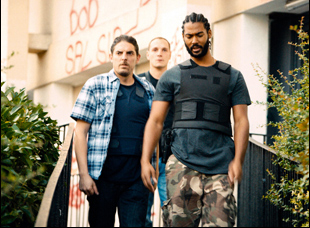
When I was a kid, I was buddies with Kim Chapiron and Romain Gavras, the son of Costa-Gavras, and when we were 16, we decided to create this collective of filmmaking because we were fed up with French cinema at the time. We were bored to tears, basically. I didn’t know I was going to make any movies, actually. I started first as an actor in 1996 or ’97, and it’s only later I decided to go behind the camera and when I did, I finally knew then that I wanted to make movies.
Is it true President Macron recently saw “Les Miserables”?
Yes. When I was in Cannes, I talked to the president, and I said, “Pretty please, watch this movie, come over to our neighborhood,” and the president didn’t go to the neighborhood, I was invited to go to the Élysée, to the palace, but I didn’t want to go. So then the president, after he saw the DVD, he was really touched and he sent two of his ministers and said, “We really need to find a solution, and there was a project that was put in place to take care of the suburbs in Paris, specifically those places where I live.” But when Macron came to power, he actually at the last minute cancelled the project, so I would like this project to be put in place again.
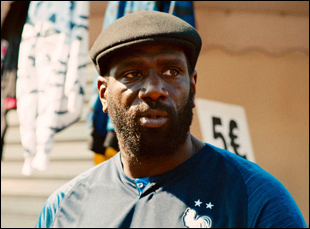
Yes, the final scene — that’s happening in the staircase that was in the tower where I used to live, and that’s the tower that’s going to be destroyed, so what we’re going to do – I have an artist that I work with, J.R. [of “Faces Places” fame], we’re going to do together a beautiful project while the tower is being destroyed.
If that’s the case, is it meaningful to have “Les Miserables” to preserve this moment in time?
We’re really happy with the reaction that this movie has been traveling and really touching people all over the place. I’ve been working on this for 20 years, it’s my neighborhood, and it’s almost like an archive [for this community] and finally it’s brought to light with this movie.
“Les Miserables” opens on January 10th in Los Angeles at the Landmark and the Arclight Hollywood and in New York at the Angelika Film Center.




